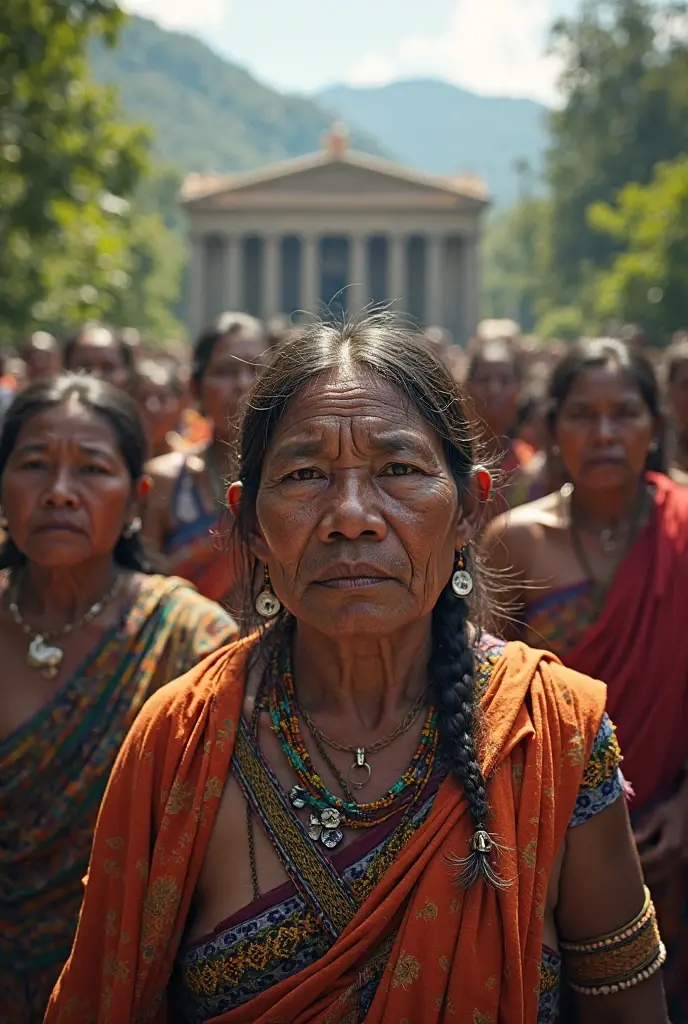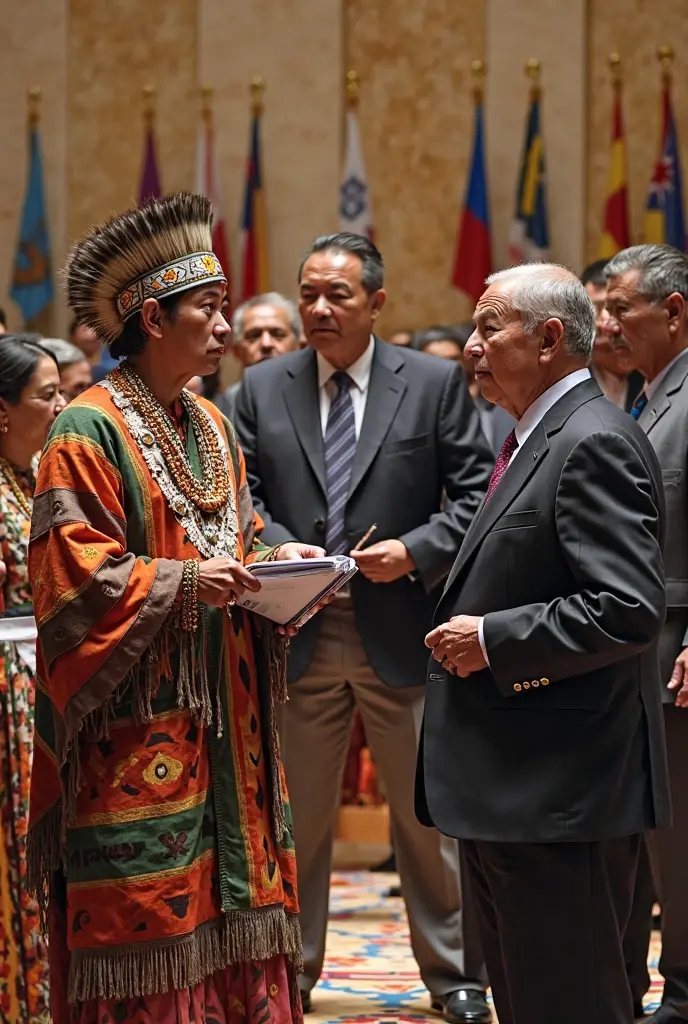The Role of International Tribunals in
the Protection of Indigenous Rights
Immerse yourself in a captivating journey through the indigenous cultures of the Americas, where their history, art, languages, and current struggles are manifested. Explore how international tribunals are essential to the defense of the rights of indigenous peoples in our article entitled "The Role of International Tribunals in the Protection of Indigenous Rights."
Introduction to the Protection of Indigenous Rights through International Tribunals
Indigenous rights are those granted to native peoples based on their cultural identity, their territory, and their autonomy. These rights encompass the defense of their ancestral lands, the right to determine their own destiny, the preservation of their languages and customs, as well as respect for their social and political organization.
The scope of these rights is essential to ensuring the continuity and progress of native communities. These include the protection of their natural resources, the ability to influence decisions that affect them, the prohibition of discrimination, and equal access to justice.
At the global level, the protection of Indigenous rights has become an increasingly important issue, focusing on the promotion of cultural diversity, equality, and justice for these historically excluded groups.
Indigenous peoples' struggle for global acceptance and respect for their rights has been constant throughout history. Since the adoption of the UN Declaration on the Rights of Indigenous Peoples in 2007, there has been significant progress in defending these rights through international legal mechanisms.
International courts have been key in protecting Indigenous rights, issuing rulings and resolutions that have set precedents for safeguarding their territories, resources, and traditional ways of life. These decisions have helped strengthen the recognition of Indigenous sovereignty and autonomy in several countries.
Thanks to the work of indigenous organizations, human rights activists, and specialized lawyers, indigenous rights violations have been brought to light and measures to protect and safeguard these rights have been adopted internationally.
The Essential Role of International Tribunals in the Rights of Indigenous Peoples
The Inter-American Court of Human Rights (IACHR) has had a vital impact on safeguarding the rights of indigenous peoples in Latin America. Over time, it has issued significant rulings and resolutions that have benefited indigenous communities in this area. One of the most representative cases is the Saramaka v. Suriname case, in which the IACHR affirmed that the State should recognize and honor the territorial and cultural rights of the Saramaka people, setting an important precedent in the defense of indigenous rights.
Furthermore, the IACHR has helped highlight human rights violations committed against indigenous communities and urged States to act to ensure their protection. Thanks to its work, notable progress has been made in the fight for justice and equity for indigenous peoples in Latin America.
It is essential that IACHR resolutions be respected by Member States, as they are binding and seek to guarantee respect for and promotion of the fundamental rights of Indigenous peoples in the region.
The International Criminal Court (ICC) has also had a notable impact on the defense of Indigenous rights globally. Through its efforts to seek justice for crimes against humanity, genocide, and war crimes, the ICC has addressed cases important to Indigenous communities, ensuring that justice is done when their rights have been violated.
A notable case is that of the Ixil Maya indigenous community in Guatemala, where the ICC held a historic genocide trial against former dictator Efraín Ríos Montt. This ruling was a milestone in the fight for justice for Indigenous communities who have suffered violence and persecution.
The ICC plays a crucial role in defending the human rights of Indigenous peoples by ensuring that those who have committed horrendous crimes against them face consequences. Their work helps prevent future violations and promote justice and reparation for Indigenous communities around the world.

Case Study: The Inter-American Court's Decision in the Case of the Kichwa People of Sarayaku v. Ecuador
The Sarayaku case represents a landmark in the defense of Indigenous peoples' rights in international courts. In 2012, the Inter-American Court of Human Rights issued a significant decision in favor of the Kichwa people of Sarayaku in Ecuador. This ruling focused on how the Ecuadorian State violated the Indigenous community's territorial and cultural rights by granting a concession for oil exploitation in their territory without obtaining their consent.
The Inter-American Court's decision determined that Ecuador violated the rights to prior consultation, free, informed, and prior consent, and collective ownership of the Sarayaku people's land. It also recognized that the right to prior consultation is a crucial mechanism for protecting Indigenous peoples' rights in relation to their ancestral territories. This case established an important foundation in international jurisprudence on the subject of Indigenous rights and prior consultation.
The Inter-American Court's ruling in the Sarayaku case highlighted the responsibility of States to respect and ensure the rights of indigenous peoples to their territories, as well as the value of obtaining their free, prior, and informed consent for any project that may affect them. This ruling has been key in the defense of the territorial rights of indigenous peoples in Latin America and has opened up opportunities for similar cases in the future.
Impact of the decision on the defense of territorial rights
The resolution of the Sarayaku case has had a notable impact on the protection of the territorial rights of indigenous peoples in the region. Following this ruling, prior consultation mechanisms have been strengthened in several Latin American countries, recognizing the need to include indigenous communities in decisions that impact their territories and way of life.
Furthermore, this decision has helped to highlight violations of indigenous peoples' rights in the context of extractive and development projects that negatively affect their territories and way of life. This has led to greater scrutiny of the actions of States and companies related to the rights of Indigenous peoples, fostering a more inclusive and respectful approach toward these communities.
The Inter-American Court's decision in the Sarayaku case has led to an important shift in the protection of Indigenous peoples' territorial rights, setting a significant precedent in the defense of their rights and promoting prior consultation as an essential mechanism to ensure their participation and autonomy in decisions that directly impact them.

Case Study: The Intervention of the International Criminal Court in the Karen Conflict in Myanmar
The confrontation between the Myanmar government and the Karen indigenous community has been marked by systematic human rights violations, such as forced displacement, sexual abuse, political persecution, and destruction of property. This situation has triggered a humanitarian crisis that has necessitated the intervention of international organizations to safeguard the indigenous population and ensure respect for their basic rights.
In this context, the importance of the International Criminal Court has been crucial in defending the rights of the Karen. Through detailed investigations and the issuance of arrest warrants against military leaders responsible for crimes against humanity, the Court has played a key role in highlighting the violations suffered by this community and has set a precedent in the pursuit of justice and reparation for the victims.
The intervention of the International Criminal Court has been essential not only in highlighting human rights violations but also in promoting accountability and responsibility among the perpetrators. Thanks to their intervention, the Myanmar government has been pressured to take significant action to ensure the protection of the Karen's rights and prevent impunity for those who have committed crimes against them.
Current Challenges in the Protection of Indigenous Rights by International Tribunals
One of the most significant obstacles to the defense of Indigenous peoples' rights by international tribunals lies in the limitations of their jurisdiction. These tribunals frequently lack the necessary authority to enforce their decisions in countries where Indigenous rights violations occur. This can lead to unenforcement of judgments in favor of Indigenous communities, thus affecting the effectiveness of the legal protection these bodies seek to provide.
Furthermore, the lack of defined mechanisms to implement the rulings of international tribunals represents a considerable challenge. Even when decisions supporting Indigenous rights are made, the lack of effective methods to ensure their implementation can diminish the protection these judicial bodies seek to provide. This highlights the need to strengthen enforcement procedures to ensure that Indigenous communities receive adequate legal protection.
In this context, addressing limitations in jurisdiction and enforcement of judgments is essential to improve the protection of Indigenous rights globally. This requires collaborating with member states and other relevant actors to develop effective methods to ensure compliance with international court rulings in matters involving Indigenous rights.
Faced with the limitations of jurisdiction and enforcement of judgments faced by international courts in the defense of Indigenous rights, the international community and NGOs have a key role to play in promoting respect for and defense of these rights. Through diplomatic pressure, public awareness, and technical support, these actors can help strengthen the defense of Indigenous rights worldwide.
Non-governmental organizations focused on Indigenous rights are essential in providing legal support, visibility, and advocacy to communities experiencing rights violations. Their work documenting cases, providing legal representation, and conducting political advocacy helps raise awareness of the problems faced by Indigenous peoples and promote solutions that respect their rights and autonomy.
Likewise, the global community, through multi-national forums and human rights monitoring systems, can exert pressure on countries to respect their obligations regarding the rights of Indigenous peoples and follow the rulings of international courts. Mutual assistance among countries, civil society organizations, and Indigenous groups is crucial to improving the protection of Indigenous rights at the international level.
Conclusions and Future Directions for the Protection of Indigenous Rights
Today, the defense of Indigenous peoples' rights has taken on significant importance worldwide. The creation and strengthening of international legal systems has become essential to ensure respect for and preservation of the rights of Indigenous communities around the world.
International courts play a very important role in this process, as they act as impartial and specialized entities in resolving disputes related to Indigenous peoples' rights. Through their decisions, these courts help establish legal precedents that protect and promote the territorial, cultural, and social rights of Indigenous communities.
Furthermore, improving international legal mechanisms means creating opportunities for dialogue and negotiation between States and Indigenous communities, with the goal of reaching agreements that ensure mutual respect and peaceful coexistence. These systems also allow for monitoring compliance with international responsibilities regarding Indigenous rights and fostering accountability in the event of violations.
The journey toward the effective protection of Indigenous peoples' rights through international courts presents both challenges and opportunities. In the future, international jurisprudence is expected to continue evolving to more comprehensively address the needs and demands of Indigenous communities.
Furthermore, cooperation between States, Indigenous organizations, and civil society will be essential to promote legal and policy changes that ensure the full observance of Indigenous rights. It is essential to encourage the inclusion of Indigenous perspectives in decision-making processes at both the national and international levels, as well as to promote the active participation of Indigenous communities in the formulation of policies that directly impact them.
In this context, international courts will play a crucial role as defenders of justice and equity for Indigenous peoples, helping to build a robust legal framework that guarantees their ancestral rights and promotes their sustainable development in harmony with the environment and other communities.

 IHRO NEWS
IHRO NEWS